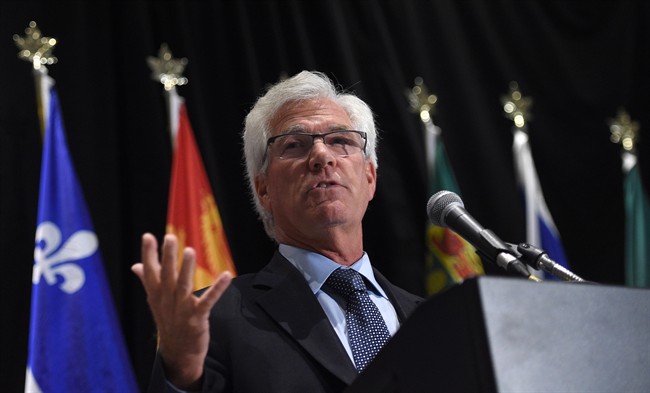OTTAWA – Natural Resources Minister Jim Carr says the federal government’s long-promised national energy strategy won’t be a single document, but an ongoing conversation with Canadians about the issue.

Carr has wrapped up a conference in Winnipeg that brought together experts and industry representatives from around the world with a view to talk about formulating such a strategy.
A national plan to ensure Canada’s energy security, encourage conservation, and promote renewable energy sources topped Carr’s 2015 mandate letter from Prime Minister Justin Trudeau.
Carr repeatedly said the Generation Energy conference in Winnipeg was a big part of developing that strategy.
However, when it was over, he said there would be no grand unveiling of the government’s thinking; rather, it will be done on an ongoing basis in multiple formats.
That seems to include the details of a planned overhaul of both the environmental assessment process and the National Energy Board, both of which are expected this fall.
“This was a very important milestone along a path that has no stop signs,” Carr said, when asked when the strategy will be unveiled. “This is a dialogue that will not stop tomorrow. This dialogue will continue.”

Get weekly money news
WATCH: Same rules applied to Energy East as other projects: Jim Carr

The information gleaned from the two-day event – “a treasure chest of creativity and good ideas,” he called it – will be analyzed and put to good use, he added – but not in any sort of overarching speech or plan for Canadians to see.
“There will be all kinds of continuing conversations with Canadians about what we heard today,” he said.
WATCH: What does Energy East’s cancellation mean for other energy projects?

“We will stay in touch with all Canadians because we know hundreds of thousands of them have cared enough to communicate their interest to us and we have a responsibility to communicate back to them.”
The provinces created their version of a national energy strategy several years ago, and Ottawa has to respect that work and mould its own strategy around it, Carr noted.
A Nanos poll conducted for the University of Ottawa’s Positive Energy think tank suggests two in five Canadians think the country is doing poorly at sharing its long-term vision for Canada’s energy future. One in five respondents said the government is doing well.
A majority of respondents said local and Indigenous governments need more ability to shape decisions about energy development, while 70 per cent say the final decision should rest with Ottawa.
Half the poll’s respondents said the government doesn’t do a great job when it comes to building confidence in how decisions are made about energy projects.
Carr has repeatedly said restoring public confidence in energy project decision-making is one of his top priorities and is why the government is redoing the assessment process for the environment and the NEB from the ground up.
The Nanos poll was part of an omnibus phone and online survey done between Sept. 23 and Sept. 26. About 1,000 Canadians over the age of 18 took part in the survey, which carries a margin of error of 3.1 percentage points, 19 times out of 20.
- Danielle Smith promises Alberta referendum over immigration, Constitution changes
- Real Canadian Superstore fined for ‘misleading’ Product of Canada displays
- ‘No reason to continue discussing’: Ontario mayor wants Andrew’s name dropped
- Canadian Tire says Triangle Rewards are its ‘linchpin’ for growth






.jpg?h=article-hero-560-keepratio&w=article-hero-small-keepratio&crop=1&quality=70&strip=all)
Comments
Want to discuss? Please read our Commenting Policy first.